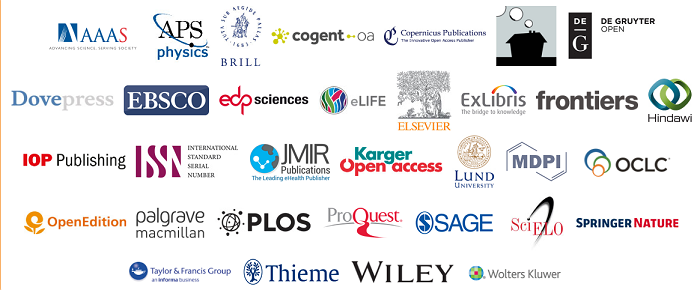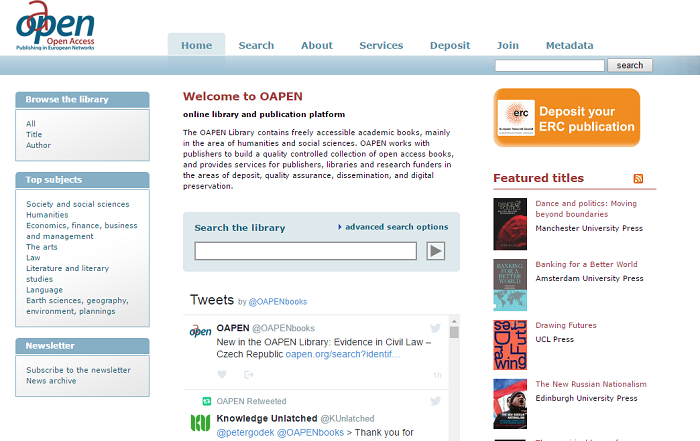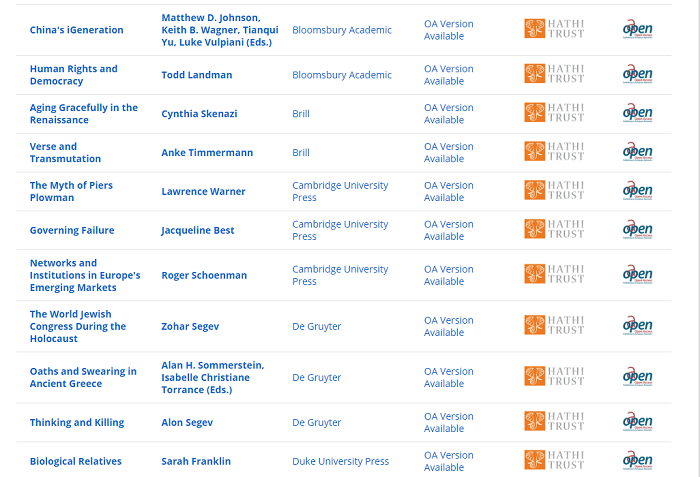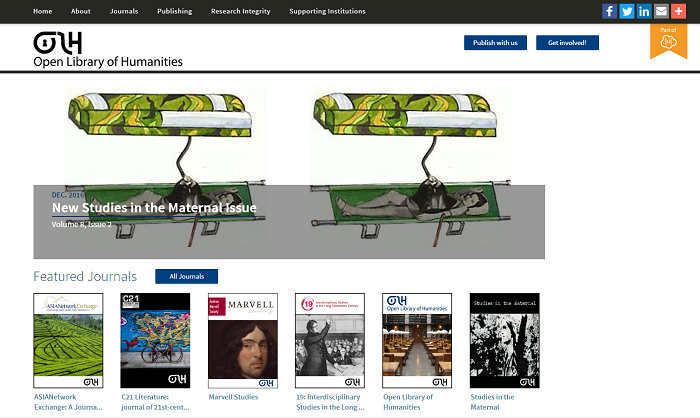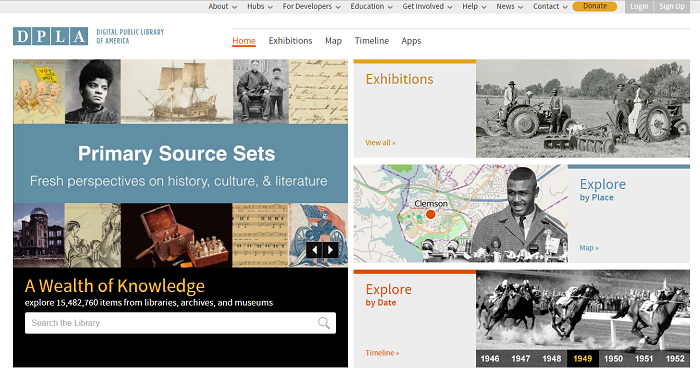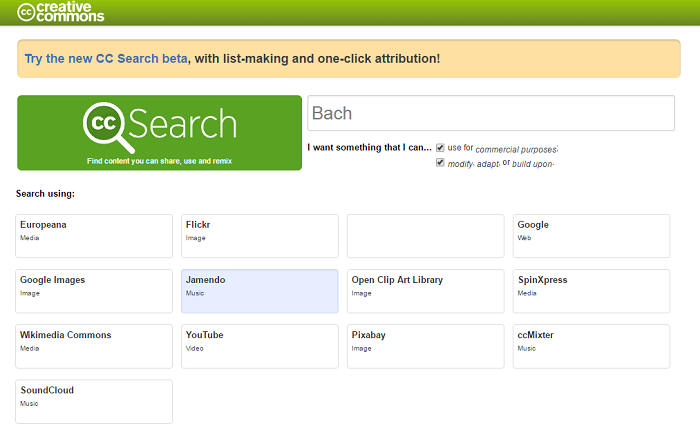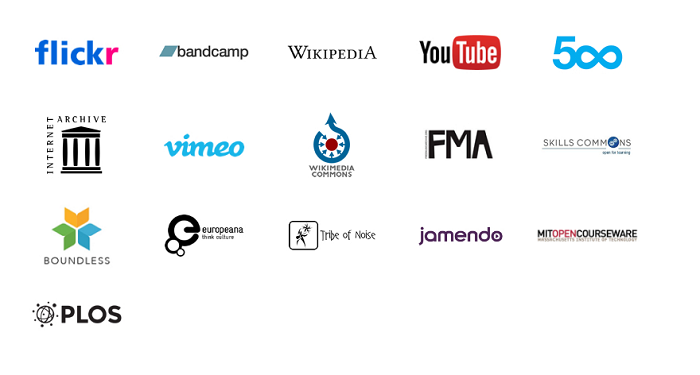Last week we posted on the Library’s Facebook page about a new resource we added to our A-Z Resource List, the Open Textbook Library, which provides free access to numerous textbooks across all disciplines. This is exciting as all students know that textbooks are expensive and the cost is a major barrier for many students. Students of universities and colleges have the advantage of getting access to many different e-books and journals through their libraries, who pay a subscription fee for most of their databases. However, we know that it can still be difficult to find what we need and there are many more people who cannot get easy access to most paid library resources. We at the IU East Campus Library think it is important for everyone to have access to the information they need, whether they are a student or not and open access has helped in that endeavor.
Open Access means that a journal or book is available online for the reader for free, without any sort of barrier besides gaining access to the internet. Open access content is still protect under some form of copyright, most notable the Creative Commons License, which means that authors agree to make their work legally available for free for almost any purpose as long as the author and original source are properly cited. Today, many researchers and authors are publishing their work more and more into open access repositories and there are even publishing companies getting in on the action. Open access journal articles are subject to rigorous peer review, so high quality, original research is still being presented. There are many more scholarly journals being published online than in print today and in fact, online, open access publishing is a great way for up and coming researchers to break into publishing and having their work accessible.
There are so many different open access resources, too many to report in this blog, but below are a few of the big ones that you may not be too familiar with or you may not realize provide open access.
Open Access Books
OAPEN Library: Open Access Publishing in European Networks http://www.oapen.org/content/
The OAPEN Library contains academic books, mainly in the social sciences and humanities, and works closely with publishers to provide free access to quality, peer-reviewed collections. So far, there are over 2500 publications from more than 100 publishers in 18 countries.
DOAB: Directory of Open Access Books http://www.doabooks.org/doab
While the OAPEN Library is a central repository for hosting and disseminating open access books, the DOAB is a discovery service, a search platform for open access books. Not only does is search for books from the OAPEN Library, but from other open access repositories as well. This discovery tool is open to all publishers who publish academic, peer reviewed book in open access. So, it is a good place to start your search if you are not sure where to begin.
Knowledge Unlatched http://collections.knowledgeunlatched.org/collection-availability-1/
Knowledge Unlatched works with libraries and publishers to “unlock” scholarly books by having libraries pledge and share in the cost of making academic books from the social sciences and humanities available under the creative common license, aka, open access. Knowledge Unlatched is similar to the DOAB that it is more a discovery service in the way that it links out to other repositories such as OAPEN or HathiTrust. Knowledge Unlatch provides a list of HSS books that you can view and choose from. Currently, it is working on providing open access to scholarly journals as well.
Project Gutenberg http://www.gutenberg.org/wiki/Main_Page
Project Gutenberg is different from the others in that it provides access to e-books, over 53,000 of free books that have moved into the public domain, meaning that their copyright term has expired. So, the majority of books that were published before the year 1923. Project Gutenberg contains literature, the classics, like Moby Dick, Jane Eyre, Frankenstein, Plato’s Republic, all of Shakespeare, Mark Twain, and more. These books can be downloaded onto your kindle or you can read them online from your tablet or computer. In two years, the collection will expand again as items published in 1923 will enter the public domain.
Open Access Journals
PubMed Central https://www.ncbi.nlm.nih.gov/pmc/
This is a popular resource that a lot of our science and nursing students are already familiar with, but many may not know that it provides open access. PubMed Central (PMC) is the U.S. National Institutes of Health (NIH) free digital archive of biomedical and life sciences journal literature.
Open Science by Elsevier
https://www.elsevier.com/about/open-science/open-access/open-access-journals
I mentioned that some publishers are getting in on the open access action and Elsevier is one. They have Open Science, which is geared towards helping researchers to be more effective in collaborating with each other and sharing their research. They provide researchers with different access options for publishing, depending on what works best for the researcher. The link to this resource contains a list of all their open access journals. Most of these are science and health related journals.
DOAJ: Directory of Open Access Journals https://doaj.org/
The DOAJ is a discovery service, a search engine, like the Directory of Open Access Books. If you are not sure where to go to look for open access articles, then this is a good place to start. You can browse by subject, search for journals, or search for individual articles. It will search and pull results from various open access repositories for articles, like Elsevier, PLOS, Wiley, Sage, Springer Nature, Brill, and more.
PLOS Biology http://journals.plos.org/plosbiology/
PLOS Biology is actually a journal, an open access biological sciences journal that features high quality, original, data driven research. The audience for this journal are educators, policy makers, the international scientific community, and interested students and members of the public. This is a great place to search for biological related articles or if you are science researcher, a possible place to publish.
Open Library of Humanities https://www.openlibhums.org/site/journals/
There seem to be a lot more open access journals for the sciences, but here is one for the humanities. This site provides access to 14 different humanities journals that you can view and search for articles or if you are a researcher in the humanities, submit your article for possible publication.
Primary Documents
Euro Docs https://eudocs.lib.byu.edu/index.php/Main_Page
If you’re researching just about anything related to European history, this is a good place to check out. It contains online sources for European history through Brigham Young University’s Harold B. Lee Library. The links connect to primary, historical documents that are transcribed, reproduced in facsimile, or translated. This source contains audio, video, maps, photographs, databases, and documentation.
Digital Public Library of America https://dp.la/
The DPLA is a discovery service, a search portal, to collections and items from America’s libraries, archives, and museums. It is a great place to search for audio, images, and primary documents related to American History. There are online exhibits and you can search for items buy using a timeline or even a map. You can even find cool apps that were developed to access and search a library’s data. Overall, it’s a neat resource to check out.
American Memory http://memory.loc.gov/ammem/index.html
This is a well-known resource amongst librarians and history buffs. American Memory is the Library of Congress’s collection of images, sound recordings, videos, documents, sheet music, maps, and prints that document the American experience, similar to the DPLA. You can browse by topics, like Advertising, Maps, Sports and Recreation, Presidents, and more or you can search via a search box. This is an amazing resource that is free and you can access from home instead of traveling all the way to Washington D.C. to see.
Need Media For a Presentation?
Creative Commons https://search.creativecommons.org/
A quick and easy place to find images, sounds, and video that you can share and use, whether for research or artistic purposes, is to go directly to Creative Commons and use their simple search box to enter your search terms. This is not a search engine per se, but offers a convenient place to search for services provided by other organizations and it ensures you are searching for material that is under the creative commons license. You can even filter your search by searching for things you can use for commercial purposes or even modify, adapt, or build upon.
You can find any of the resources above easily by clicking on the links in this blog, through Google, or even by accessing the Library’s A-Z Resource List. It’s important to keep in mind that free access doesn’t mean it is not protected by copyright. So, treat all open access works with respect (cite your sources!) and abide by copyright and licensing terms. Now if you are you interested in sharing your work or accessing others through open access or want to know more about creative commons licensing, then there are few places to go. Check out Creative Commons (https://creativecommons.org/about/) or the Open Access Scholarly Publishers Association (http://oaspa.org/) to find out more about how you can get involved in sharing, creating, and researching. You can also contact us, your local librarians, for help and questions on any of these topics at iueref@iue.edu.


